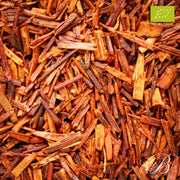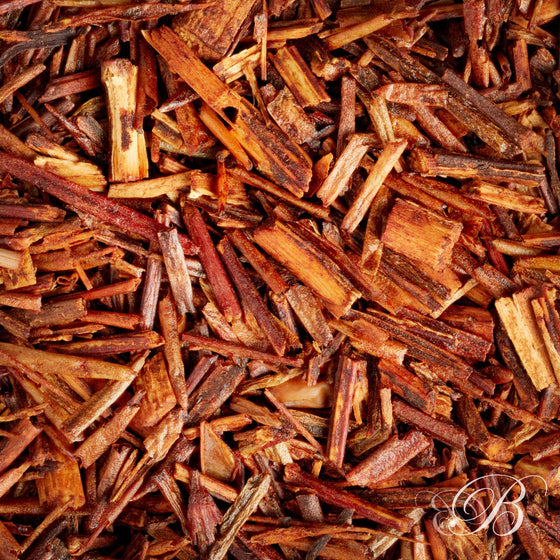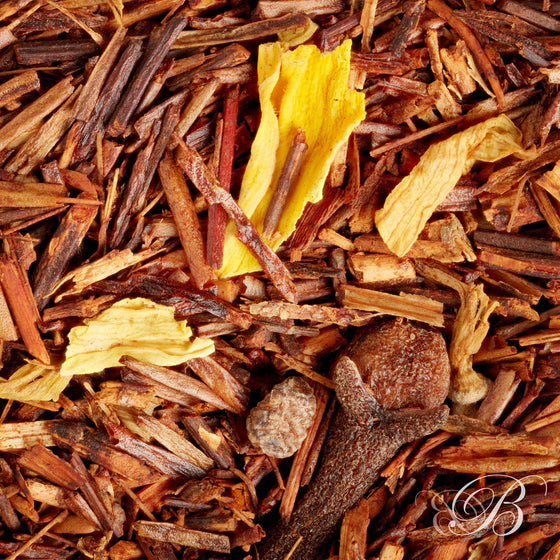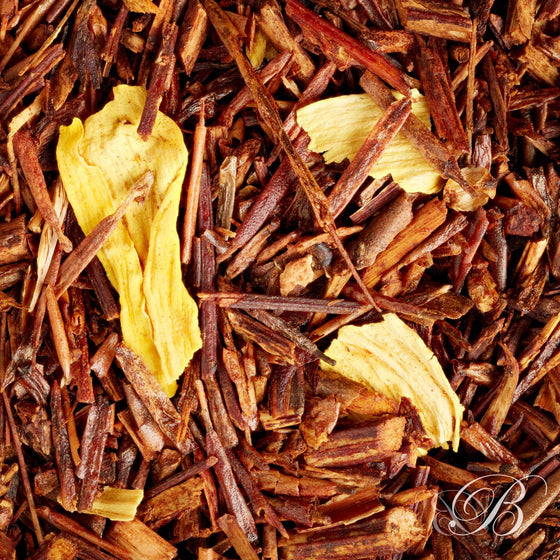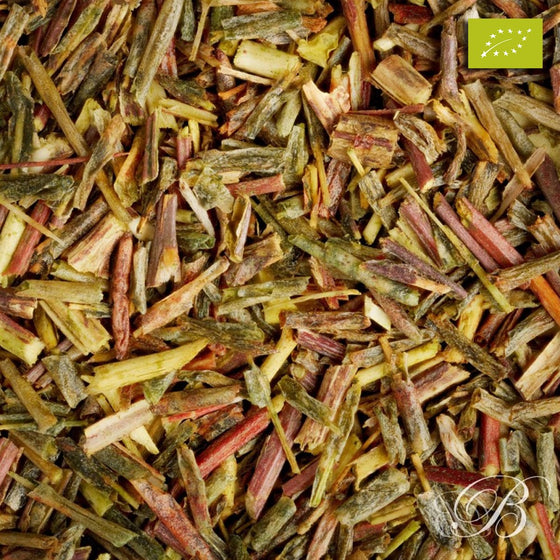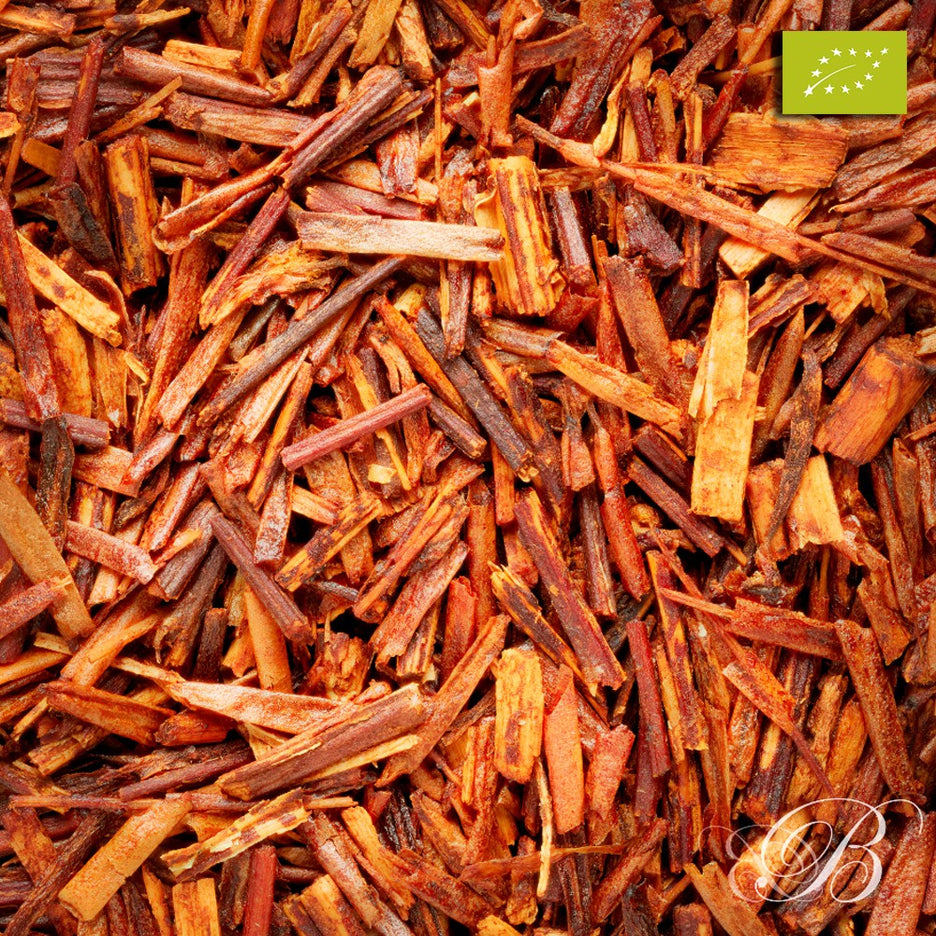
Rooibos Organic
Organic natural rooibos
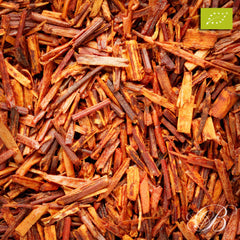
Rooibos Organic
100% secure payment
3 free samples with each order
Fast and free delivery for purchases over €65
Red herbal tea from South Africa
This red herbal tea comes from the Rooibush, a thorny shrub with thin stalks and yellow flowers, that grows wild in the Cederberg region in South Africa. The leaves are harvested from January to May. It offers a cup with a delicate and very distinct taste, theine-free and very rich in minerals and vitamins.
- Theine-free infusion with a very special delicate taste
A selection from Cape Town
This rooibos comes from a very old family farm located in the village of Klipsteen, a few hours from Cape Town, renowned throughout the region for the exceptional quality of its organic crops. For several generations, a family we have known for many years has cultivated rooibos there with patience and expertise, on preserved land, swept by dry desert winds and nourished by the African sun. It was there that we discovered this rare batch, with a particularly sweet and nuanced profile, which we have chosen to include in our collection as a benchmark rooibos.
Did you know?
The word rooibos literally means "red bush" in Afrikaans, referring to the coppery hue its leaves take on after fermentation. Although it is sometimes referred to as "red tea," this term is a misnomer: rooibos does not come from the tea plant (Camellia sinensis), but from a very distinct shrub, named Aspalathus linearis, belonging to the legume family. It grows only in South Africa, in the semi-desert region of Cederberg, over an area as vast as Corsica. Its cultivation, still largely artisanal, is the fruit of the work of more than 500 producers, who perpetuate ancestral know-how.
One field, two crops
In the Cederberg region, rooibos sometimes shares its soil with another iconic crop: wheat. On some plots, producers alternate plantings according to the seasons, or allow both crops to coexist in the same field. This association, which may seem surprising, actually contributes to soil balance and the natural regeneration of the land. It reflects a living agriculture, respectful of the rhythm of plants and available resources, a philosophy that fully corresponds to the spirit of the organic rooibos we have chosen.
Rooibos and food pairings
Organic Rooibos Nature is a wonderful accompaniment to simple pastries: dried fruit cakes, madeleines, wholegrain breads, or buttered and honeyed toast. It also pairs well with mild savory dishes, such as pumpkin soup or fresh sheep's milk cheese. Its soft texture and lack of bitterness make it an excellent companion for caffeine-free snacks or brunches.
Recipes based on Organic Rooibos Nature
Brewed hot in almond or oat milk, it becomes the perfect base for a “rooibos latte,” sweetened with a touch of honey or maple syrup. It can also be brewed cold, with a few slices of pear or dried apricot, for a summery version. In cooking, it is also used as an infusion base to flavor rice pudding or homemade compote, bringing a subtle and warming touch without added sugar.
10730
Red herbal tea from South Africa
This red herbal tea comes from the Rooibush, a thorny shrub with thin stalks and yellow flowers, that grows wild in the Cederberg region in South Africa. The leaves are harvested from January to May. It offers a cup with a delicate and very distinct taste, theine-free and very rich in minerals and vitamins.
- Theine-free infusion with a very special delicate taste
A selection from Cape Town
This rooibos comes from a very old family farm located in the village of Klipsteen, a few hours from Cape Town, renowned throughout the region for the exceptional quality of its organic crops. For several generations, a family we have known for many years has cultivated rooibos there with patience and expertise, on preserved land, swept by dry desert winds and nourished by the African sun. It was there that we discovered this rare batch, with a particularly sweet and nuanced profile, which we have chosen to include in our collection as a benchmark rooibos.
Did you know?
The word rooibos literally means "red bush" in Afrikaans, referring to the coppery hue its leaves take on after fermentation. Although it is sometimes referred to as "red tea," this term is a misnomer: rooibos does not come from the tea plant (Camellia sinensis), but from a very distinct shrub, named Aspalathus linearis, belonging to the legume family. It grows only in South Africa, in the semi-desert region of Cederberg, over an area as vast as Corsica. Its cultivation, still largely artisanal, is the fruit of the work of more than 500 producers, who perpetuate ancestral know-how.
One field, two crops
In the Cederberg region, rooibos sometimes shares its soil with another iconic crop: wheat. On some plots, producers alternate plantings according to the seasons, or allow both crops to coexist in the same field. This association, which may seem surprising, actually contributes to soil balance and the natural regeneration of the land. It reflects a living agriculture, respectful of the rhythm of plants and available resources, a philosophy that fully corresponds to the spirit of the organic rooibos we have chosen.
10730
You may also like
Last viewed products
Excellent
Cher client,
Nous vous remercions sincèrement pour vos avis.
